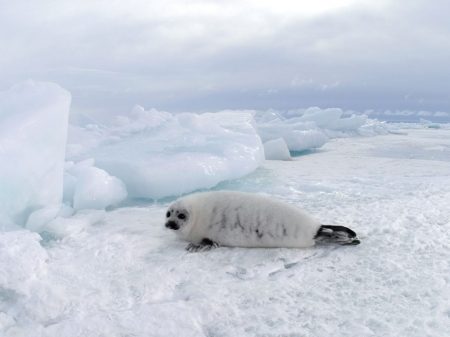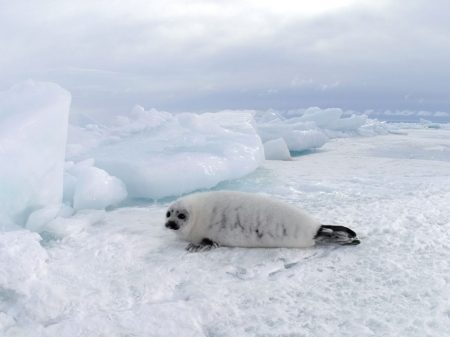

What if Stephen Harper was Stephen Harp Seal?
Canada’s Prime Minister is headed to Prague this week to kick off free trade negotiations with the European Union. If talks are successful, the country stands to gain billions in trade wealth.
But there’s an obstacle blocking the way. The blood of baby harp seals threatens to rain on Stephen Harper’s trade parade. The intense pressure from Europe — and the world — to end government-sanctioned animal cruelty is swelling to a crescendo.
This week, members of the European Parliament are expected to vote in favour of a law banning the import of seal products. It’s a major strike against the sadistic seal slaughter that goes on for a few weeks every March and April on the remote ice floes in the Gulf of St. Lawrence.
The EU’s seal vote is on Tuesday. Then on Wednesday, Harper is scheduled to launch the free trade talks at the Canada-EU annual summit. It’s not exactly a dynamic public relations roll-out for Harper.
The inhumane nature of the hunt has been one of the most contentious issues between the two parties. In fact, the largest slaughter of marine mammals on Earth has caught the eye — and the ire — of many nations appalled by the barbaric ritual. More than a million baby seals have been beaten to death in Eastern Canada in the past four years.
The United States has been prohibiting seal products since 1972. And now Croatia, Slovenia, Austria, Germany, France, the Netherlands, Belgium, Italy, Panama and Mexico have either banned trade in seal products or announced their intentions to do so. In mid-March, Russian Prime Minister Vladimir Putin outlawed the hunting of baby harp seals in the White Sea region, labeling the hunt a "bloody business."
It’s not just foreigners who disagree with the cruel blood sport. About 80 percent of Canadians oppose it too. Most are too sickened and horrified to watch the footage or hear the details. And many Canadians don’t even know it still goes on. The hunt collapsed in the 1980s before being quietly re-introduced in the mid-90s, resurrected by government subsidies.
Many animal welfare groups won’t even call the slaughter a "hunt" because there is no chase involved. The seal pups are still learning to swim and eat solid food. They lie on the ice, helpless and trusting until they are bludgeoned to death by young, strapping men with spiked clubs.
Veterinary studies have concluded that about half of the seals are still conscious when they are skinned alive.
About 90 percent of the men who participate in the commercial seal hunt are Newfoundland fishermen, and most are not aboriginals. And the ones who are aboriginal remain protected — First Nations have been exempted from the proposed legislation.
Despite the will of its citizens’ majority, Canada’s federal government remains inexplicably defiant in its blind support of the grisly slaughter. According to a report in the Calgary Herald, Ottawa is monitoring the EU vote closely. If the ban on seal products passes, the government intends to challenge it under World Trade Organization rules, said Kory Teneycke, Stephen Harper’s director of communications.
The seal hunt has already cost Canada hundreds of millions of dollars. In 2005, animal welfare groups formed the ProtectSeals campaign, whose main line of attack has been convincing American grocery stores and restaurants to boycott Canadian seafood exports, a $3-billion industry annually. The move is designed to attack the sealers’ core income coming from their seafood catch.
The boycott has already cost Canadian businesses millions. Just the value of snow crab exports alone to the U.S. have declined $750 million since the ProtectSeals campaign began, and seafood exports from Newfoundland to the U.S. have dropped 44 percent according to the Humane Society of United States. HSUS is a major backer of the ProtectSeals campaign and one of the largest animal welfare organizations in the world.
Animal welfare groups aren’t taking all the credit for the declines in seafood exports. Other economic factors are also at play. But since ProtectSeals started, it has successfully lobbied 5,000 American grocery stores and restaurants to stop carrying Canadian seafood, including popular chains such as Whole Foods and Trader Joe’s. There’s no doubt that ProtectSeals is having an impact.
By contrast, the take from the so-called hunt is miniscule. Last year, its gross revenues were $12 million, and typically at least half of that is eaten up by expenses. And with world markets for seal skins closing like dominoes, so have prices plunged — to $15 per pelt from last year’s $33. In 2008, the seal hunters took home about $1,100 each, a fraction of their annual income. This year, pelts are piling up unwanted in warehouses, and sealers will be lucky to break even.
The hunting lobby portrays sealers as poverty-stricken fishermen who need the revenue and the meat to feed their families, but the facts don’t support these arguments. They aren’t eating the meat. Footage documents hundreds of thousands of bloody carcasses left to bleed out on the ice.
Even those who don’t care about animals should have something to say against the seal hunt, considering the millions it costs Canadians. A fleet of 10 government vehicles including ice breakers and helicopters assist sealers in getting to the remote ice floes for this dangerous, macho rite of passage. Last year, four sealers drowned, and another two almost died. The ensuing search and rescue took several days and cost the Coast Guard — or should I say the taxpayers — millions of dollars.
Still, Canadian politicians seem determined to sacrifice an ocean full of cash for what amounts to a bloody drop in the bucket.
Why?
Maybe Stephen Harper will have an answer to that when he faces the European Union on Wednesday.
Animal lovers the world over will be waiting to hear it.
DO YOU WANT TO HELP SAVE BABY SEALS?
Speaking out against the heartless killing of seal pups is easy, and your voice counts.
These links will propel you to action:
A senator speaks about the Harb Seal Bill
Canadian Senator Mac Harb is the first parliamentarian in history to
table a bill devoted to ending the seal slaughter. He has already received
30,000 letters of support at his office. Make yours one of them!
You can bet he’ll be riding that wave of
public support all the way to Parliament Hill in Ottawa.
Email the Senator at harbsealbill@sen.parl.gc.ca
Senator Harb will be speaking at the Vancouver Art Gallery tomorrow. If you live nearby, drop in and show your support. I’ll be there to interview him and blog the event.
The Vancouver Art Gallery
750 Hornby Street, Vancouver
Heritage Court Room (Second Floor)
The event will be on Sunday, May 3rd from 6:00 PM to 8:00 PM. Doors will open at 5:30 PM.
Carreen Maloney can be reached at carreen@fuzzytown.com
Join the newsletter and never miss out on dog content again!
"*" indicates required fields
By clicking the arrow, you agree to our web Terms of Use and Privacy & Cookie Policy. Easy unsubscribe links are provided in every email.